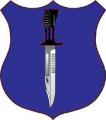Over all is a bright blue sky and powerful sun. Such is the scenery of the theatre of war. The inhabitants of these wild but wealthy valleys are of many tribes, but are similar in character and condition. The abundant crops which a warm sun and copious rain raise from a fertile soil, support a numerous population in a state of warlike leisure. Except at the times of sowing and of harvest, a continual state of feud and strife prevails throughout the land. Tribe wars with tribe. The people of one valley fight with those of the next. And to the quarrels of communities are added the combats of individuals. Khan assails khan, each supported by his retainers. Every tribesman has a blood feud with his neighbour. Every man's hand is against the other, and all against the stranger. Nor are these struggles conducted with the weapons which usually belong to the races of such development. To the ferocity of the Zulu are added the craft of the Redskin and the marksmanship of the Boer. The world is presented with that grim spectacle, "the strength of civilisation without its mercy ". At a thousand yards the traveller falls wounded by the well-aimed bullet of a breech-loading rifle. His assailant, approaching, hacks him to death with the ferocity of a South-Sea Islander. Here the weapons of the nineteenth century, are in the hands of the savages, of the stone age.
Every influence, every motive, that provokes the spirit of murder among men, impels these mountaineers to deeds of treachery and violence. The strong aboriginal propensity to kill, inherent in all Human beings, has in these valleys, been preserved in unexampled strength and vigour. That religion, which above all others was founded and propagated by the sword—the tenets and principles of which are instinct with incentives to slaughter and which in three continents has produced fighting breeds of men—stimulates a wild and merciless fanaticism. The love of plunder, always a characteristic of hill tribes, is fostered by the spectacle of that opulence and luxury which, to their eyes, the cities and the plains of the south display. A code of honour not less punctilious than that of old Spain, is supported by vendettas as implacable as those of Corsica. In such a state of society, all property is held directly by main force. Every man is a soldier. Either he is the retainer of some khan—the man-at-arms of some feudal baron as it were—or he is a unit in the armed force of his village—the burgher of mediaeval history.
In such surrounding we may without difficulty trace the rise and fall of an ambitious Pathan. At first he toils with zeal and thrift as an agriculturist, on that plot of ground which his family have held since they expelled some former possessor. He accumulates in secret a sum of money. With this he buys a rifle from some daring thief, who has risked his life to snatch it from a frontier guard-house. He becomes a man to be feared. Then he builds a lower to his house and overawes those around him in the village. Gradually they submit to his authority. He might now rule the village; but he aspires still higher. He persuades or compels his neighbours to join with him, in an attack on the castle of a local khan. The attack succeeds. The khan flies or is killed, the castle captured. The retainers make terms with the conqueror. The land tenure is feudal. In return for their acres they follow their new chief to war. Were he to treat them worse than other khans treated their servants, they would sell their strong arms elsewhere. He treats them well. Others resort to him. He buys more rifles. He conquers two or three neighbouring khans. He has now become a power. Many, perhaps all, states have been founded in this way, and it is by such steps that civilisation painfully stumbles through her earlier stages. But in these villages the warlike nature of the people and their hatred of control, arrest the further progress of development. We have watched a man, able, thrifty, brave, fighting his way to power, absorbing, amalgamating, laying the foundations of a more complex and interdependent stateof society. He has so far succeeded. But his success is now his ruin. A combination is formed against him. The surrounding chiefs and their adherents are assisted by the village populations.
The ambitious Pathan, oppressed by numbers, is destroyed. The victors quarrel over the spoil, and the story closes, as it began, in bloodshed and strife. The conditions of existence that have been thus indicated have naturally led to the dwelling-places of these tribes being fortified. If they are in the valley they are protected by towers and walls loopholed for musketry. If in the hollows of the hills they are strong by their natural position. In either case they are guarded by a hardy and martial people, well armed, brave, and trained by constant war.
This state of continual tumult has produced a habit of mind which recks little of injuries, holds life cheap and embarks on war with careless levity. The tribesmen of the Afghan border, afford the spectacle of a people, who fight without passion, and kill one another, without loss of temper. Such a disposition, combined with an absolute lack of reverence for all forms of law, and authority, and a complete assurance of equality, is the cause of their frequent quarrels, with the British power. A trifle rouses their animosity. (pp.4-7)
)





 there would be robust questioning in the Houses of Parliament over the conduct of campaigns, the consequences perhaps of having parliamentarians with military experience.
there would be robust questioning in the Houses of Parliament over the conduct of campaigns, the consequences perhaps of having parliamentarians with military experience.







Bookmarks